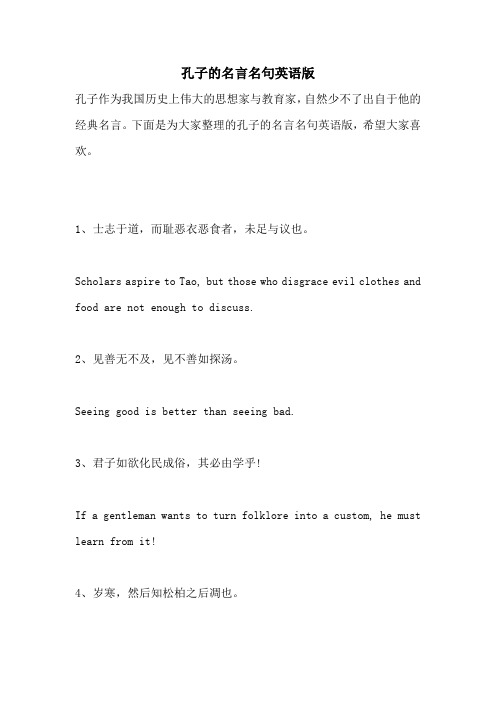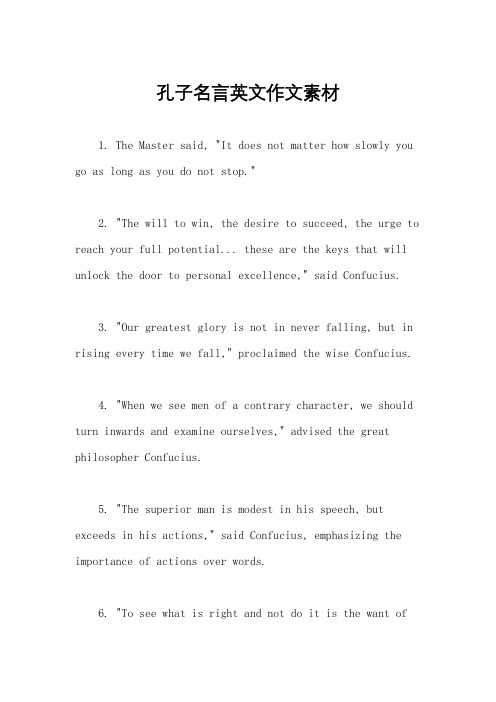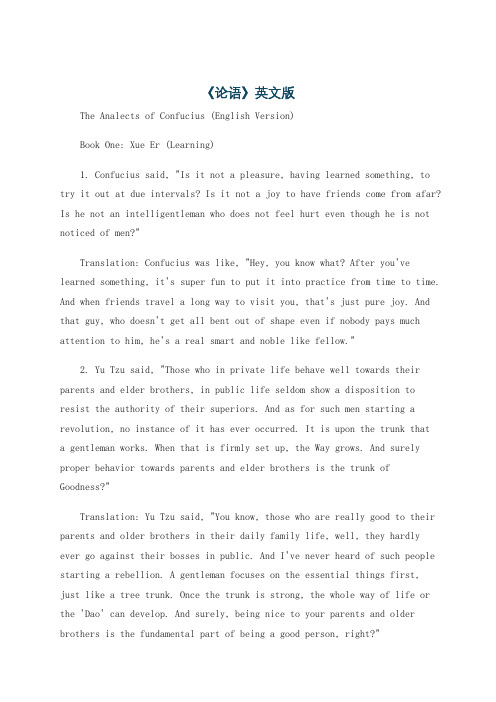孔子以礼治国语录英文版
孔子语录英文版,值得珍藏!

孔子语录英文版,值得珍藏!英语口语·吉米老师说吉米老师非常喜欢中国传统经典文学,尤其是论语。
今天推荐给大家的文章是孔子语录英文版,绝对值得你收藏!英语·名人语录注:本文所选语录由英国苏格兰汉学家理雅各先生翻译。
理雅各,英文名James Legge,詹姆斯·莱格,英国苏格兰汉学家,曾在香港主持英华书院,翻译多本中国古代著作。
性相近也,习相远也。
By nature, men are nearly alike; by practice, they get to be wide apart.过而不改,是谓过矣。
Not to mend the fault one has made is to err indeed.己所不欲,勿施于人。
What you do not want done to yourself, do not do to others. 言必信,行必果。
Keep what you say and carry out what you do.君子以文会友,以友辅仁。
The superior man on grounds of culture meets with his friends, and by their friendship helps his virtue.三军可夺帅也,匹夫不可夺志也。
The commander of the forces of a large State may be carried off, but the will of even a common man cannot be taken from him.后生可畏,焉知来者之不如今也?A youth is to be regarded with respect. How do you know that his future will not be equal to our present?有朋自远方来,不亦乐乎?Is it not delightful to have friends coming from distant quarters?人不知而不愠,不亦君子乎?Is he not a man of complete virtue, who feels no discomposure though men may take no note of him?父在,观其志。
与孔子相关的英语词汇和句段(辛界)

与孔子有关的英语词汇和句子辛界周游列国To journey around the principality states祭祀To offer sacrifices to gods or ancestors大典Grand ceremony创办私学To establish private schools姓名中的名字(丘)Given name,"Qiū"家族排行名(仲尼)Capping name,"Zhòngní",indicating that he was thesecond son in his family贤人People of virtue,intellectuals,a wise man六经The six channels/classics儒家思想谱系The lineage of Confucianism弟子disciples经典著作classics孔子学说Confucian school博学者Erudite people万世师表The teacher for all ages名人Celebrity,eminent person,famous person有教无类Instruction knows no class distinction.Teaching without discrimination.入学Enter school以人为本People-oriented身教示范Teaching by one’s own example学习氛围the learning circumstances心态mental condition为政以德Governing by virtueExercising government on moral principles以德治国Moral governance政治动荡Political unrest/instability礼崩乐坏Etiquette and recreation corruption描述孔子生平重要事迹和观点的句子●孔子(公元前551年9月28日-公元前479年4月11日),名丘,字仲尼,鲁国陬邑(今山东曲阜)人,中国古代思想家、教育家,儒家学派创始人。
诸子百家儒家论语为政(中英文)

诸子百家儒家论语为政(中英文)1 为政: 子曰:“为政以德,譬如北辰,居其所而众星共之。
”为政: 孔子说:“管理国家要以身做则。
如同北极星,安然不动而衆星绕之。
”Wei Zheng: The Master said, 'He who exercises government by means of his virtue may be compared to the north polar star, which keeps its place and all the stars turn towards it.'2 为政: 子曰:“诗三百,一言以蔽之,曰‘思无邪’。
”为政: 孔子说:“《诗经》三百首,用一句话可以概括,即:‘思想纯洁’。
”Wei Zheng: The Master said, 'In the Book of Poetry are three hundred pieces, but the design of them all may be embraced in one sentence - 'Having no depraved thoughts.''3 为政: 子曰:“道之以政,齐之以刑,民免而无耻;道之以德,齐之以礼,有耻且格。
”为政: 孔子说:“以政令来管理,以刑法来约束,百姓虽不敢犯罪,但不以犯罪为耻;以道德来引导,以礼法来约束,百姓不仅遵纪守法,而且引以为荣。
”Wei Zheng: The Master said, 'If the people be led by laws, and uniformity sought to be given them by punishments, they will try to avoid the punishment, but have no sense of shame. If they be led by virtue, and uniformity sought to be given them by the rules of propriety, they will have the sense of shame, and moreover will become good.'4 为政: 子曰:“吾十有五而志于学,三十而立,四十而不惑,五十而知天命,六十而耳顺,七十而从心所欲,不逾矩。
孔子的名言名句英语版

孔子的名言名句英语版孔子作为我国历史上伟大的思想家与教育家,自然少不了出自于他的经典名言。
下面是为大家整理的孔子的名言名句英语版,希望大家喜欢。
1、士志于道,而耻恶衣恶食者,未足与议也。
Scholars aspire to Tao, but those who disgrace evil clothes and food are not enough to discuss.2、见善无不及,见不善如探汤。
Seeing good is better than seeing bad.3、君子如欲化民成俗,其必由学乎!If a gentleman wants to turn folklore into a custom, he must learn from it!4、岁寒,然后知松柏之后凋也。
Only in cold winter does one know that the pine and the cypress are the last to shed their leaves.5、其身正,不令而行;其身不正,虽令不从。
If he is in a right position, he will not act accordingly; if he is in a wrong position, he will not obey.6、君子尊贤而容众,嘉善而矜不能。
A gentleman is respectful and tolerant, but kind and reserved.7、夫达也者,质直而好义。
察言而观色,虑以下人。
Fudaye, straight and righteous. Look at what you say and look at what you see. Consider the following people.8、轻千乘之国,而重一言之信。
A thousand times lighter than a thousand, but one word more.9、有朋自远方来,不亦乐乎?见利思义,见危授命。
孔子名言英文作文素材

孔子名言英文作文素材1. The Master said, "It does not matter how slowly you go as long as you do not stop."2. "The will to win, the desire to succeed, the urge to reach your full potential... these are the keys that will unlock the door to personal excellence," said Confucius.3. "Our greatest glory is not in never falling, but in rising every time we fall," proclaimed the wise Confucius.4. "When we see men of a contrary character, we should turn inwards and examine ourselves," advised the great philosopher Confucius.5. "The superior man is modest in his speech, but exceeds in his actions," said Confucius, emphasizing the importance of actions over words.6. "To see what is right and not do it is the want ofcourage," declared Confucius, highlighting the importance of courage in doing what is right.7. "The man who moves a mountain begins by carrying away small stones," said Confucius, emphasizing the power of perseverance and gradual progress.8. "Real knowledge is to know the extent of one's ignorance," said the wise Confucius, emphasizing the importance of humility in seeking knowledge.9. "The more man meditates upon good thoughts, the better will be his world and the world at large," advised Confucius, highlighting the power of positive thinking.10. "The will to win, the desire to succeed, the urge to reach your full potential... these are the keys that will unlock the door to personal excellence," said Confucius, emphasizing the importance of determination and ambition.。
孔子说英文版(下)(小编整理)

孔子说英文版(下)(小编整理)第一篇:孔子说英文版(下)礼之用,和为贵。
有子说:“礼的应用,以遇事和顺为可贵。
”In conducting the rites, seeking harmony is the most valuable principle.里仁为美,择不处仁,焉得知?孔子说:“选择住处要选在风俗淳美的地方,否则怎么能算明智呢?”One should choose to dwell in such a place where there are men of benevolence.Otherwise, how can one be said to be wise?名不正,则言不顺。
孔子说:“名分不正,说话就不能顺理成章。
”If names are not rectified, what is said will not sound reasonable.其身正,不令而行;其身不正,虽令不从。
孔子说:“执政者行为端正,不发命令老百姓也会跟着走;执政者行为不端正,纵三令五申老百姓也不会听从。
”If the ruler acts properly, the common people will obey him without being ordered to;if the ruler does not act properly, the common people will not obey him ever after repeated injunctions.巧言令色,鲜矣仁!孔子说:“一贯花言巧语,伪装和善的人,不会有什么仁慈。
”A man who speaks with honeyed words and pretends to be kind cannot be benevolent.巧言乱德。
孔子说:“花言巧语足以败坏道德。
” Sweet words will ruin one’s virtue.群居终日,言不及义,好行小慧,难矣哉!Those who spend the whole day long merely chatting idly, saying unreasonable things and parading their cleverness will accomplish little.人而无信,不知其可也。
《论语》英文版

《论语》英文版The Analects of Confucius (English Version)Book One: Xue Er (Learning)1. Confucius said, "Is it not a pleasure, having learned something, to try it out at due intervals? Is it not a joy to have friends come from afar? Is he not an intelligentleman who does not feel hurt even though he is not noticed of men?"Translation: Confucius was like, "Hey, you know what? After you've learned something, it's super fun to put it into practice from time to time. And when friends travel a long way to visit you, that's just pure joy. And that guy, who doesn't get all bent out of shape even if nobody pays much attention to him, he's a real smart and noble like fellow."2. Yu Tzu said, "Those who in private life behave well towards their parents and elder brothers, in public life seldom show a disposition to resist the authority of their superiors. And as for such men starting a revolution, no instance of it has ever occurred. It is upon the trunk thata gentleman works. When that is firmly set up, the Way grows. And surely proper behavior towards parents and elder brothers is the trunk of Goodness?"Translation: Yu Tzu said, "You know, those who are really good to their parents and older brothers in their daily family life, well, they hardly ever go against their bosses in public. And I've never heard of such people starting a rebellion. A gentleman focuses on the essential things first,just like a tree trunk. Once the trunk is strong, the whole way of life or the 'Dao' can develop. And surely, being nice to your parents and older brothers is the fundamental part of being a good person, right?"Book Two: Wei Zheng (The Practice of Government)1. Confucius said, "Guide them by edicts, keep them in line with punishments, and the common people will stay out of trouble but will have no sense of shame. Guide them by virtue, keep them in line with the rites, and they will, besides having a sense of shame, reform themselves."Translation: Confucius said, "If you just boss people around with laws and scare them with punishments, the ordinary folks will avoid getting into trouble, but they won't really feel ashamed of doing wrong. But if you lead them with good morals and make them follow proper etiquettes, not only will they feel ashamed when they do wrong, but they'll also correct themselves."2. Ji Kangzi asked Confucius about government, saying, "What would you think if, in order to move closer to those who possess the Way, I were to kill those who do not follow the Way?" Confucius replied, "In administering your government, what need is there for you to kill? Just desire the good yourself and the common people will be good. The moral character of the ruler is like wind and that of the common people is like grass. In whatever direction the wind blows, the grass always bends."Translation: Ji Kangzi asked Confucius about how to run a government. He said, "Hey, Confucius, what if I killed those who don't follow the right path so that I can get closer to those who are on the right track?" Confucius was like, "Dude, when you're running the government, why do you need to kill? If you just want good things yourself, the common people will be good too. The ruler's moral quality is like the wind, and the common people are like grass. No matter which way the wind blows, the grass will always bend in that direction."。
孔子说英文版

孔子说英文版第一篇:孔子说英文版不听老人言,吃亏在眼前。
If an old dog barks, he gives counsel.爱之,能勿劳乎?忠焉,能勿诲乎?孔子说:“爱他,就不能让他贪图安逸。
忠于他,就不能不对他进行教诲。
”Confucius said, “To love him means not to let him indulge in comfort;to be loyal to him means to teach him.”饱食终日,无所用心,难矣哉!孔子说:“整天吃饱饭没事干的人,不会有什么出息。
”He who always has full stomach but does nothing meaningful is simply a good-for-nothing.博学于文,约之以礼,亦可以弗畔矣夫!孔子说:“君子广泛地学习文化典藏,并用礼来约束自己,就可避免离经叛道了。
”A gentleman will not go astray so long as he studies extensively and regulates himself with the rites.不愤不启,不悱不发。
孔子说:“我教学生的方法是:不到他们苦思冥想也不能明白的时候,不去开导他们;不到他们心里想说又总说不明白的时候,不去启发他们。
”I will not enlighten my students until they have really tried hard but failed to understand.I will not instruct them until they have something to say but fail to make themselves understood.不患人之不己知,患其不能也。
孔子说:“不怕别人不了解自己,就怕自己没有真才实学。
- 1、下载文档前请自行甄别文档内容的完整性,平台不提供额外的编辑、内容补充、找答案等附加服务。
- 2、"仅部分预览"的文档,不可在线预览部分如存在完整性等问题,可反馈申请退款(可完整预览的文档不适用该条件!)。
- 3、如文档侵犯您的权益,请联系客服反馈,我们会尽快为您处理(人工客服工作时间:9:00-18:30)。
孔子以礼治国语录英文版
Introduction
Confucius, also known as Kong Zi, was a Chinese philosopher and educator who lived during the Spring and Autumn period of ancient China. He advocated for the moral cultivation of individuals and the application of rituals, or li, to govern the state. This article explores the key principles and teachings of Confucius on how to govern a country with the practice of rituals.
The Importance of Rituals in Governance
1. Rituals as the Foundation of Society
•Confucius believed that rituals were the foundation of a harmonious society. Without proper rituals, people would not know how to behave and social order would collapse.
•The practice of rituals allowed individuals to cultivate their moral character and become virtuous. This virtuous conduct would
then extend to their interactions with others, promoting a sense
of social harmony.
2. Rituals as a Means of Developing Virtuous Leaders
•According to Confucius, a good leader should possess virtue and moral integrity. The practice of rituals served as a means of
cultivating these qualities in individuals, including leaders.•When leaders consistently demonstrated virtuous behavior, they would be respected and trusted by their subjects. This mutual
respect and trust formed the basis of effective governance.
The Principles of Confucian Governance
1. Li: The Practice of Rituals
•Li refers to the observance of rituals and proper conduct in various aspects of life. In governance, it involves the
application of rituals to regulate the behavior of both leaders and citizens.
•Through the practice of rituals, the government promotes social harmony, stability, and moral cultivation.
2. Ren: Benevolence and Humanism
•Ren is another important principle in Confucian governance. It emphasizes benevolence, compassion, and humanism.
• A government that upholds the value of ren prioritizes the well-being of its citizens and ensures fair treatment and social
justice.
3. Junzi: The Ideal Gentleman
•Confucius believed that a virtuous and morally upright leader, known as a junzi, was essential for good governance.
• A junzi leads by example, demonstrating integrity, wisdom, and compassion. They inspire and guide others towards the path of
righteousness.
Implementing Confucian Governance
1. Moral Education and Character Cultivation
•Confucius emphasized the importance of moral education in cultivating virtuous individuals.
•To implement Confucian governance, education should focus on character development, emphasizing values such as integrity,
filial piety, and humility.
2. The Role of Rituals in Governance
•Rituals should be integrated into the governance system to regulate the behavior of leaders and citizens.
•Government officials should strictly adhere to the rituals, setting an example for the rest of society. This includes
demonstrating humility, respecting elders, and practicing proper
conduct.
3. Relationship between Leaders and Citizens
•Confucian governance emphasizes the reciprocal relationship between leaders and citizens.
•Leaders should treat their subjects with benevolence and compassion, ensuring their well-being and addressing their needs
and concerns.
•Citizens, in turn, should respect and obey their leaders, fulfilling their responsibilities and contributing to the
betterment of society.
4. Continuity through Rituals
•Confucius believed that the practice of rituals would ensure the continuity of proper governance across generations.
•Rituals, when inherited and faithfully passed down, would maintain social harmony and stability, creating a virtuous cycle of
governance.
Conclusion
Confucius’ teachings on governance through the practice of rituals
offer valuable insights into effective leadership and societal order. By prioritizing the cultivation of virtues, implementing rituals, and emphasizing the relationship between leaders and citizens, Confucian governance seeks to establish a just and harmonious society. The principles advocated by Confucius continue to have relevance in modern times, shedding light on the importance of ethics, morality, and humanism in governance.。
